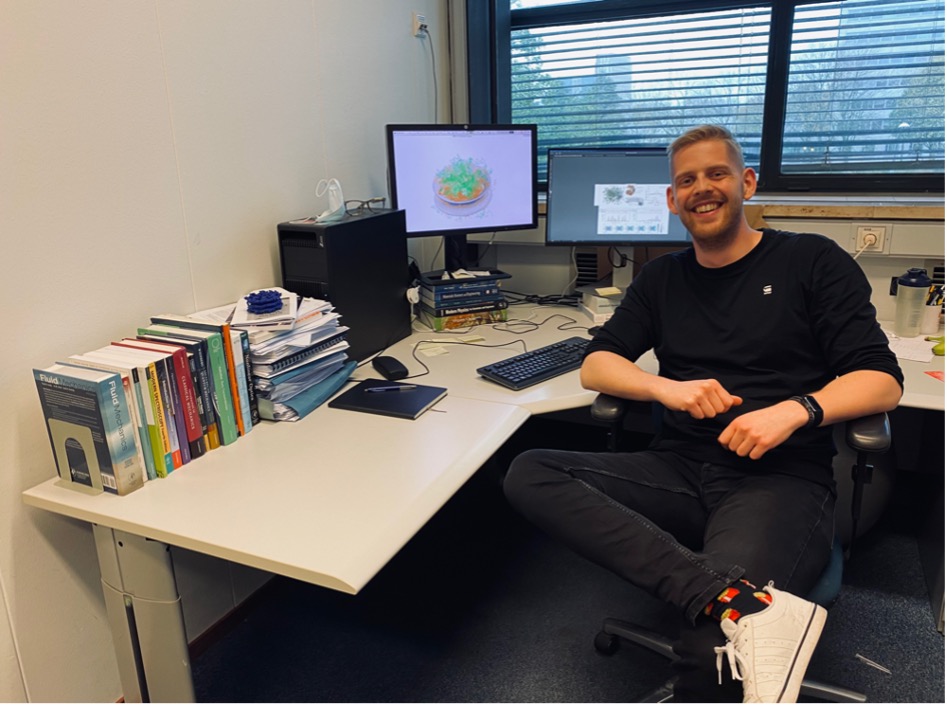Advent calendar - December 6th - Henry de Vries
In the Zernike Institute Advent Calendar, we are presenting 24 short spotlights in December. In these specials, we highlight PhD students, postdocs, and technicians of our research groups - providing a glimpse into their typical day at work. In Episode 6 meet Henry de Vries.

Briefly describe your current position and role within ZIAM
I am a PhD candidate at the Micromechanics group at the Zernike Institute for Advanced Materials working on computational modeling of transport through (artificial) nuclear pore complexes. I’ve also served as a PhD-sounding board member for ZIAM/FSE.
What does a typical workday look like for you?
This changed a bit throughout the years: pre-COVID I did a significant amount of teaching and supervision, and depending on the day of the week, I would often be occupied with a variety of teaching tasks, or research tasks. I ‘finished’ teaching before COVID started, and from that point on my days changed. Although the picture suggests that I work in a nicely organized office on campus, virtually all of my work for the past 1.5 years was done at home, since I mainly need a high-speed internet connection, an extra computer screen and a bit of coffee to do my work. Now that the end of my PhD is coming near, I spend the first hour or so of my day writing and editing while my mind is at its sharpest. After that, I start up my regular working day and briefly work on a mix of planning, small tasks, catching up on e-mail, and making sure that my simulations are still running smoothly. I divide the rest of the day into blocks, where I dedicate each block to a specific goal. I find that this keeps me focused on the things that matter. Most of the blocks consist of programming, where I prepare or analyze my simulations, or use computational tools to study proteins and their structures. Other blocks of time I spend by doing usual research activities like reading and/or writing papers, or meeting with colleagues, students, collaborators or supervisors.
What has been the biggest challenge you faced this year?
Like many of us, I realized -after- the lockdown restrictions were released a bit, how much I missed the office life: chatter, discussions, in-person meetings, etc. However, I think my big challenge (which quite frankly is still ongoing) is the combined process of finishing up a PhD while figuring out the next move. The end of a PhD is a crossroads in many ways (some may even wittingly label it an existential crisis) that encompasses many professional and personal choices. What do I (not) want to do? What am I good at? Stay an academic or not? What do I need to learn? Where to live? What is the meaning of life? Messi or Ronaldo? It took quite a lot of time, effort and introspection to find my (professional) identity besides being an academic, and at the moment of writing I feel I finally started to figure some of those things out.
You were a member of the ZIAM PhD sounding board, tell us a bit about what this means for you?
I remember being invited for a meeting between PhD-candidates and the scientific coordinator on how to distribute teaching loads more evenly among PhD students. Since I fell on the far side of the spectrum, having been a course developer and frequent supervisor, I felt that I had something to add to the discussion. I noticed that I enjoyed bringing in ideas on improving the workplace for my peers. When I heard that there was a spot opening up on the PhD sounding board for both ZIAM and the faculty, I decided to join, since I wanted to help out peers and university staff by thinking along. I sat on the sounding board for nearly two years and enjoyed helping the institute and faculty come up with ideas to improve the success and wellbeing of PhD-students.
Contact: Henry de Vries
More news
-
15 September 2025
Successful visit to the UG by Rector of Institut Teknologi Bandung
